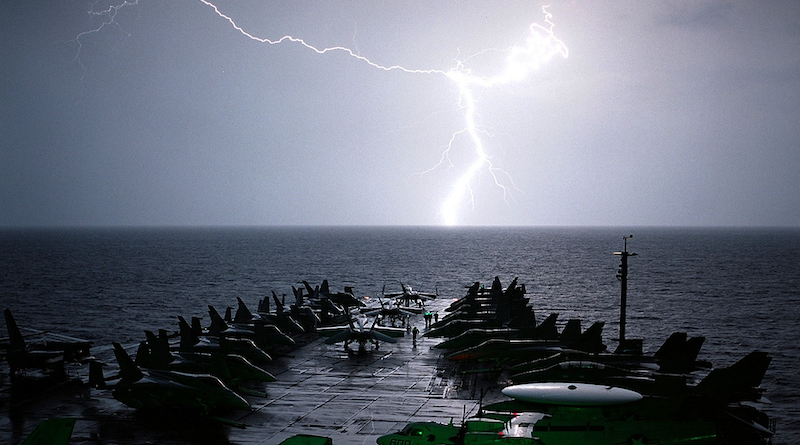Does Indonesia Need An Aircraft Carrier? – OpEd
By Muhammad Rayhan Faqih Syahfa and Gufron Gozali
Recently, PT PAL (Indonesia state-owned naval enterprise) announced that they are planning to build an aircraft carrier for Indonesia in 2023. This plan sparked debate whether Indonesia truly needs an aircraft carrier. Budgetary, capacity and capability, objectives and bureaucracy might become several questions surrounding the plan. Do Indonesia really need it?
An aircraft carrier is crucial due to its ability to project air forces without any airstrips nearby. Countries such as the US and its allies could manoeuvre far from its land to the Pacific and the South China Sea, same applied to China. However, the authors did not think that Indonesia’s plan to build an aircraft carrier is plausible. The authors’ understanding is that Indonesia is not an offensive country, the deployment of fleets consisting of aircraft carriers is noted to be an aggressive move. Indonesia does not have any interest to spread any threats, instead to deter any threats, especially when surrounded by potential threats such as the aggressivity of China in the region. If deterrence is the objective, then why spend Indonesian tax-payers to build an expensive aircraft carrier?
Indonesia is an archipelagic country. Building an aircraft carrier would not be suitable to protect the whole country. If the aircraft carrier would be deployed within Indonesian territory, it is just not plausible, unless Indonesia wants to change its principle and join the power competitions with other countries. Instead, In line with Indonesian former defence minister, General (ret) Gatot Nurmantyo, said in 2016, Indonesia could begin to utilise its outer islands, building and upgrading the military base and modernising its armaments. Furthermore, the condition of Indonesian military fleets is still concerning. Moreover, the non-combat accident within the Indonesian fleet must be taken into account.
Shifting focus to more tangible issues
Then, if the aircraft carrier plan actually materialises, this will become a major problem. The government as a stakeholder should be able to shift focus first. I think the most important thing right now is how to direct the defence doctrine to align with future interests and threats. The Global Maritime Fulcrum (GMF) doctrine, which is expected to be the first grand strategy for Indonesia, is in fact only a discourse and nothing more than an effort to increase investment. It is common knowledge that the TNI is dominated by the Army (AD), therefore the birth of the GMF was initially a hope to increase the Navy’s role in the TNI, but in the end this is just wishful thinking.
Not only is the issue of the grand strategy unrealised, the Navy’s defense equipment is very worrying. MEF in 2024 states that the Navy must have 10-12 submarines, 56 frigates and corvettes and 66 patrol boats. However, currently the Navy only has 4 submarines, 24 corvettes, 7 frigates, and the Navy does not yet have a destroyer. With less than 2 years remaining, the MEF will certainly be difficult to realise.
Coupled with the age of defence equipment that is getting old, from the LAB 45 report in the period from 2004-2021 it is recorded that there have been 13 Navy ship accidents. This data then shows that every year there is at least 1 accident. The unclear defence doctrine, the MEF that has not been achieved, and the accident-prone defence equipment should be the main concerns.
Synchronisation of existing regulations
Reflecting on regulations, Law Number 16 of 2012 relating to the defence industry states that an independent domestic industry must be established. In this case, the need for defence equipment is supplied by the domestic industry. President Jokowi, as the supreme commander of the Indonesian National Armed Forces (TNI), emphasised that the independence of the defence industry can be realised through the continuous procurement of defence equipment. However, in the ten years since the enactment of Law No. 16/2012, the industry has only been able to supply 15-25% of the defense equipment needs.
However, in the case of the construction of an aircraft carrier, if in the future the existing rules are used as an excuse to meet the needs of defence equipment and to show the might of PT PAL, of course this is not plausible. All institutions should synchronise or collaborate in encouraging the improvement of the quality and absorption of domestic defence equipment. The government forms regulations, the defence ministry and the TNI draft the appropriate defence blueprints, and state-owned companies such as PT. PAL and Pindad improve technology.
Policy Advice
Indonesia is still facing significant issues which are slowing the progress of its Minimum Essential Force (MEF) which was set to be completed in 2024. Budgetary is one of the problems; Indonesia’s military budget is among the lowest and it is argued that it will not be enough to modernise the fleet in time. Nevertheless, Indonesia still managed to build and buy several crucial armaments. However, putting an aircraft carrier into the plan will damage the initial plan to modernise the fleet.
Aircraft carriers are expensive, and it is better to allocate the funds to further projects such as anti-aircraft systems, drones and other surveillance systems or even frigates, corvettes and submarines which the number Indonesian have is concerning. The ratio between what the Indonesian military has and the area that must be covered is not balanced. Thus, increasing the number of fleets would be even more plausible.
Hence, recognising all the problems surrounding the Indonesian military armaments and its effort to modernise, adding with Indonesia deterrence objective, it is not plausible to conclude aircraft carrier into the plan for modernising Indonesian fleet. Many perspectives we could see to find it irrelevant for Indonesia. The policymaker could see this as an optimistic move yet they have to realise that it is not a realistic one.
Rayhan Faqih Syahfa is a masters student in Security and Strategic Studies at Macquarie University. Gufron Gozali is a Research Intern in LAB 45

